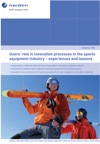Users’ role in innovation processes in the sports equipment industry
Abstract
The main objective of this project is to contribute to our knowledge about user-driven innovation and to suggest how knowledge on user-driven innovation may be included in innovation efforts and systems both for the sports equipment industry and for other industries.The study is primarily based on case studies of how firms within the Nordic sports equipment and outdoor industry involve users in their innovation efforts. Our studies concentrate on firms producing equipment for winter sport and outdoor recreation. The study builds upon a large number of interviews with firms and key persons as well as extensive analysis of available written material and research literature.
The results focus on the identification of certain key user groups in the sports equipment innovation cycle: user innovators, professional and sponsored users, enthusiastic amateurs, passionate insiders and chains and retailers. We consider the extent to which these users influence or take part in innovation processes within technical design, visual design, branding and the development of product systems.
The report concludes with policy recommendations for how firms may take advantage of each user group. In this respect we present some key points and examples on firms’ interaction with users in innovation processes. Other recommendations consider public policy and suggest that public policy ought to encourage firms to take advantage of knowledge held by those groups. In society a large number of user groups exist and public policy ought to stimulate use of their knowledge for a broader purpose, including societal development. Merging user groups in order to stimulate cross sector development, in addition to organising meeting places may be a theme for public policy at the
regional level.





[…] Innovation in the sports industry. […]